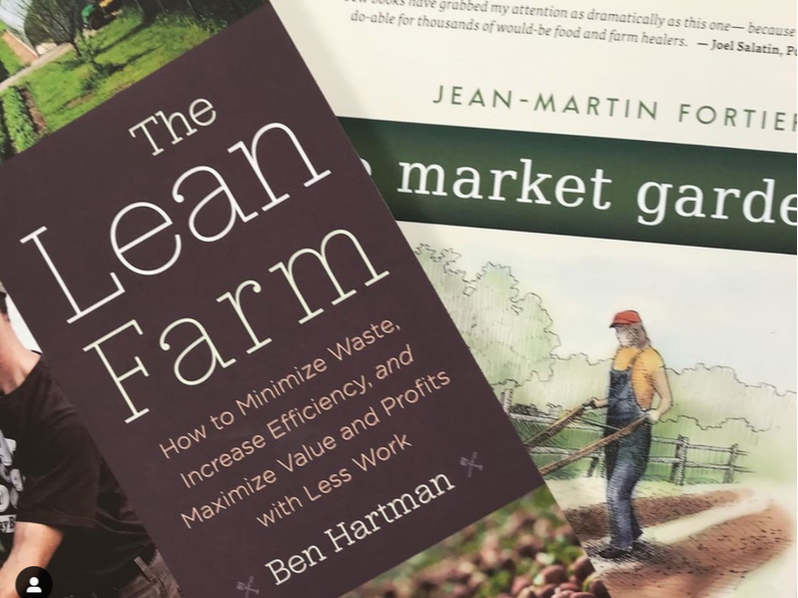The best way to learn farming is from farmers
The apprenticeship program gives you an opportunity to receive hands-on experience combined with reading, classes, and training that will help you decide if farming is a good fit for you. Apprentices work on local, sustainably-run farms, where they experience the day-to-day operations of a farm. They also take a non-credit online course and attend farm tours, meet new and experienced farmers, receive textbooks and on-the-job and formal training from their host farmers. In essence, this program will help give you the basics you need to get started. Growing Growers' apprentices need only a willingness to work hard and learn while they do it. Scroll down for answers to our most commonly asked questions!
Two Track Options Available
|
FARM APPRENTICESHIP
Cost: $500 Apprentice receives: -Online course access (12 mo.) -Books -Participation in workshops & farm tours Apprentice agrees to: -Work 20-40 hours per week on production farm (hours & pay agreed upon with host farm) -8-10 hours of 1-on-1 training with host farmer -Complete pre and post-skills evaluation -Complete program evaluation at end of season |
EXPLORE FARMING
Cost: $250 Explorer receives: -Online course access (12 mo.) -Participation in workshops & farm tours Explorer agrees to: -Work 4-8 hours per week on non-profit farm (hours + pay agreed upon with host farm) |
Parts of an APPRENTICESHIP
|
FIELD WORK is a large component of the apprenticeship program, because it is a large component of farming. Some farms include apprentices in their marketing and sales department as well (farmers market, CSA packaging or delivery, restaurant sales, etc.). These positions are completely flexible and are entirely dependent on your agreement with the host farmer. Some apprentices work as volunteers on a minimal weekly basis while others accept full or part-time paid positions!
*Apprentices should contact potential host farmers prior to submitting an application, but this is not required! The host-farmer work relationship is independently managed from the Growing Growers program and we can help you find the best farmer for your needs. |
|
FARM TOURS are held monthly, February through September, cover topics relevant to sustainable farming. Farm tours include presentations by local farmers, extensions agents, and other experts. Over the course of the season, farm tours introduce ideas that help apprentices learn about growing food, as well as how to plan a farm business.
*Apprentices are required to attend 5 farm tours and are welcome to go to other Growing Growers elective workshops, agricultural conferences, or professional meetings for free. These electives allow apprentices to explore specific interests that may not be part of the core workshops. The farm tours cover the metro area and apprentices need to cover the cost of driving to the workshops. Note: that may be as far as two hours away from the host farm. |
|
ONE-ON-ONE TRAINING In addition to training during the work day, apprentices receive 8-10 hours of focused, one-on-one training from their host farmer(s). This training is a way for host farmers to share the specifics of their farm. Any topics can be chosen and they can include skills like bee-keeping, budgeting, soil building, rotations, production planning, seed selection and ordering, equipment operation, organic certification, market planning, budgets, and more!
|
|
ONLINE COURSE & MATERIALS The Growing Grower's core workshop material is now being presented as a non-credit online course through K-State Canvas. This will provide apprentices with lectures on twelve module topics, optional assignments and readings, discussion boards, and other supplemental materials all in one place! We will still be handing out books during the farm tours. These cover topics such as business planning, equipment, soils, pests and disease management, and other topics relevant to start-up growers. Each season's curricula is slightly different and examples of textbooks include Jean-Martin Fortier's The Market Gardener, Elliot Coleman's The New Organic Grower, SARE's Building Soils for Better Crops and MOSES' Fearless Farm Finances.
*If apprentices fail to attend a farm tour, they will not receive the books |
Frequently asked questions:
When is the application due?
Applications are due March 1st, and reviewed by the program organizing committee. Applicants are typically notified of their acceptance into the program within two weeks of the due date.
When does the program start and for how long?
The program formally starts the date of the first core workshop (usually mid-March. The start date of the applicant's on-farm apprenticeship is dependent on the host farmer and the agreed upon terms of employment/volunteer internship. Typically apprentices work late March or early April and through the summer season. Some apprentices may even stay on as employees after completion of the program!
The graduation ceremony during the annual OHREC Field Day, formally marks the end of the program. As long as all the program requirements are met, the student will graduate from the apprenticeship by this time. Workshops can extend throughout the year and apprentices are encouraged to still attend even if they have graduated.
The graduation ceremony during the annual OHREC Field Day, formally marks the end of the program. As long as all the program requirements are met, the student will graduate from the apprenticeship by this time. Workshops can extend throughout the year and apprentices are encouraged to still attend even if they have graduated.
How much is the program?
The apprenticeship program fee is $500. This fee includes all workshops, tours, course materials and on-farm training. The tuition is non-refundable and can be broken up into two separate payments throughout the season.
Are there scholarships available?
A limited number of partial scholarships are available that can fund 50% of the tuition. Contact us at [email protected] for more information on applying for a scholarship and availability.
How do I apply?
You can submit an application via email or mail to our Olathe address. Visit our application page for more details:
Do I need to find a host farm before I apply?
No... but it is strongly encouraged! Many host farmers are willing to offer paid positions or even housing so these are details that we recommend you arrange before applying. All contact information for farmers is on the host farm pages!
With that said, you can always apply before your arrangements with the host farm are determined! If needed, we are here to help you pick a host farmer and initiate that connection. We will accept applications regardless of your host farmer situation!
With that said, you can always apply before your arrangements with the host farm are determined! If needed, we are here to help you pick a host farmer and initiate that connection. We will accept applications regardless of your host farmer situation!
Do I have to work a certain amount of hours?
Yes and no! Every apprentice must commit to working with their host farm on a regular basis, however, the amount of hours you want to work is entirely dependent on your relationship with the farm. Some host farmers might only offer paid part time positions for apprentices who can work 20+hours/week while other farmers might take volunteer apprentices that commit to several hours a month. It is up to you and your host farmer to work out the best schedule for you!
Do you take international applicants?
At this time, we are unable to take international applicants.
What does the apprenticeship look like in a pandemic?
Our apprenticeship will still consist of the same components but with a slight difference! Apprentices will still have the opportunity to work with their host farmers as all hosts will be following social distancing and CDC guidelines. However, as long as CDC & CISA guidelines limit social gatherings, we will be offering workshops and farm tours online through Zoom. All textbooks and materials will be mailed to the apprentice's address at no charge.
see what our previous graduates are up to...
Many of our graduates have become farmers across the country. Several of our graduates have even become host farmers themselves, including Two Birds Farm, Mellowfields Urban Farm and Woodland City KC. Read more about some of our former apprentices by clicking the button below!
Growing Growers ICT
Are you located in the Wichita / Sedgwick County area? Check out our partner, Growing Growers ICT for apprenticeship program opportunities or contact their program manager, Kinzie Kirkland at [email protected]





